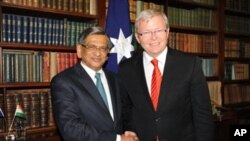Indian Foreign Minister S.M. Krishna wraps up a three-day visit to Australia, which included talks on uranium sales and the safety of international students.
Relations between Australia and India are on the mend after they were strained by a series of attacks on international students in Sydney and Melbourne.
Since June 2009 more than 100 assaults against young Indian expatriates have been reported. Many were thought to be racially motivated, while Australian authorities stressed that others were the work of opportunistic thieves. New Delhi, however, accused Canberra of failing to protect its students.
Australia was stung by the criticism and ordered extra police patrols in known trouble spots.
On a three-day visit to Australia, India’s foreign minister, R.M. Krishna, said the situation had improved markedly.
"Indian students feel quite secure. They feel quite confident," he said.
Krishna has held lengthy talks with his Australian counterpart, Kevin Rudd over a variety of regional and global concerns, including closer collaboration on security issues in Asia. In addition, the two agreed to work closely in the G20 grouping of leading economies.
Another key focus of the talks was uranium, which is used to produce nuclear power and weapons.
Australia has about 34 percent of the world’s easily extracted uranium reserves. But Australia only exports it for use in civilian power stations and does not sell it to countries, like India, that have not signed the Nuclear Non-Proliferation Treaty.
Foreign Minister Krishna asked Canberra to soften its stance.
"I did raise the question of uranium supply to India in the larger context of climate change. And if you have to have clean energy, then according to India the only option is to have nuclear energy, and if you have to have nuclear energy, then we certainly need uranium, but we respect Australia's position on this because it is not India centric, it is not India specific," said Krishna”
Australia is maintaining its position on uranium sales, although Foreign Minister Kevin Rudd said India has managed its nuclear capacity responsibly.
"India has not been responsible for a single act of nuclear weapons proliferation anywhere in the world," he said.
Australia is eager to seize business and trade opportunities in India’s fast-growing economy. India is Australia’s third largest export market, and is India’s six largest trade partner. Ties are expected to be further enhanced later this year when Rudd visits India.
Uranium, Student Attacks Dominate Australia-India Talks




